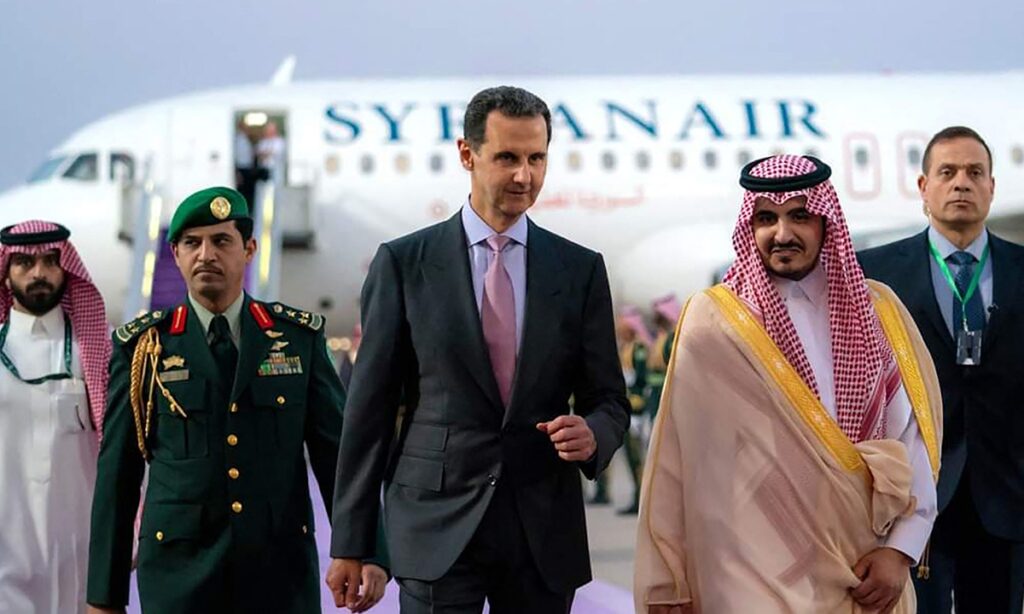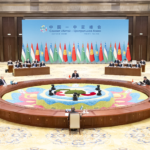China is happy to witness Arab countries taking new steps on the path of unity and self-development with new achievements being made, Chinese President Xi Jinping said in a congratulatory letter sent to the Arab League Summit, which kicked off on Friday in the Saudi city of Jeddah.
Xi said the Arab League has long been committed to strengthening the Arab world through unity and promoting peace, stability and development in the Middle East, and he is glad to see that Arab countries have taken new steps and made new achievements on the path of unity and self-improvement.
Xi also expressed his appreciation to Saudi Arabia, saying that as an important force in a multi-polar world, it has made positive contributions to strengthening solidarity and coordination among Arab countries and maintaining peace and stability in the Middle East.
The summit on Friday saw the presence of Syrian President Bashar al-Assad attending for the first time in 12 years. It marks the official return of Syria into the 22-nation bloc amid a reconciliation wave, with the help of China’s mediation.
Syria’s return shows the Arab world will bottom out from division and create a new path for it to pursue independent diplomacy through peaceful approaches, Chinese observers said. The policy of the US only seeks to maintain its hegemonic status and harms peace, development rights and interests of countries in the Middle East, and will not be sustainable amid the new heights of solidarity and self-development among Arab countries, they noted.
Topics related to Syria expected to be discussed at the summit are the return of Syrian refugees to their country and the rebuilding of Syria, and official normalization of diplomatic relations with Syria, media reports said. During the summit, Assad is also expected to hold bilateral meetings with several heads of state, according to Syrian media Al-Watan.
The presence of the Syrian president at the Arab League Summit for the first time in over a dozen years reflects the return of Syria to the Arab world after more than a decade of isolation in the region, said Liu Zhongmin, a professor at the Middle East Studies Institute of Shanghai International Studies University.
The Arab League suspended the membership of Syria, one of its founding members, after the Syrian crisis erupted in 2011. On May 7, the Arab League held a meeting and announced the agreement to return Syria to the bloc.
Liu told the Global Times on Friday that this is the latest progress after the emergence of a reconciliation wave including the resumption of diplomatic ties between Saudi Arabia and Iran. The two countries’ reconciliation, driven by China’s mediation, not only helps to promote the easing of tensions in the Middle East, but also to change the regional political layout and strategic culture characterized by confrontation.
The idea and practice of peaceful development, coordinated talks, tolerance and learning from each other that China has been dedicated to promoting is becoming a common option for countries in the region and hopefully will help to promote a trend of easing tensions and development in the region, Liu noted.
In the congratulatory letter, Xi said China and Arab countries have enjoyed a strong traditional friendship over the millennia. In recent years, the strategic partnership between the two sides has been growing and achieving fruitful results, setting a good example for South-South cooperation and mutual benefit.
China is ready to work with Arab states to carry forward the spirit of China-Arab friendship, implement the outcomes of the first China-Arab summit held in December last year, build a higher-level strategic partnership and write a new chapter in China-Arab friendship, Xi noted in his letter.
The return of Syria to the Arab League also shows the Arab world will bottom out from division, internal conflict and strife, though challenges still remain, Liu noted, adding that regional Arab countries are bound to participate in Syria’s reconstruction and economic development following its return to the Arab League.
The Arab world is heading toward a new era in which member states uphold unity and their willingness to stand on their own feet and solve regional problems through peaceful approaches is stronger than ever, said Zhu Weilie, director of the Middle East Studies Institute at the Shanghai International Studies University.
The Arab League’s move to reinstate Damascus led to objections from the US and other Western countries. “We have been consulting with our partners about their plans, and making clear that we will not normalize relations with the Assad regime, and that our sanctions remain in full effect,” White House spokesperson Karine Jean-Pierre said previously.
Zhu told the Global Times that the US’ illegal military presence in Syria and its sanctions policy against the country are incompatible with the trend of regional relations, as the regional demand for US security guarantees has declined sharply.
If the US persists in imposing sanctions on relevant countries, it will only widen the rift in its relations with regional countries, Zhu said.
China urged the US to put aside its geopolitical obsession and immediately lift unilateral sanctions on Syria, since Washington’s long-term involvement in the Syrian crisis through military intervention and economic sanctions has resulted in large numbers of civilian casualties and created difficulties in the country’s economic development and reconstruction process.
The Arab League summit will also see the attendance of Ukrainian President Volodymyr Zelenskyy. He arrived in Jeddah on Friday and wrote in a tweet: “beginning my first-ever visit to the Kingdom of Saudi Arabia to enhance bilateral relations and Ukraine’s ties with the Arab world.”
Zelenskyy’s presence at the summit is more likely aimed at seeking humanitarian aid and financial support from the Arab region, as well as to boost Ukraine’s food exports there, analysts said. They added that the Ukrainian president could also be interested in seeking suggestions for a peaceful solution to the crisis from Saudi Arabia, as there has been a successful example of reconciliation between Riyadh and Teheran with the assistance of China.
Therefore, experts said that a pragmatic solution for de-escalating the conflict in Ukraine is more necessary than weapons or military aid from the West, and if Kiev understands this, that would be really helpful for the peace process of the Ukraine crisis.
On the Ukraine crisis, China always stands on the side of peace, and its core stance is to facilitate talks for peace. China has been playing a key role in facilitating talks for peace and made efforts for an early ceasefire and restoration of peace, Xi stressed in April during a phone conversation with Zelenskyy. Xi said that dialogue and negotiations are the only viable way out of the Ukraine crisis.
(Global Times)




